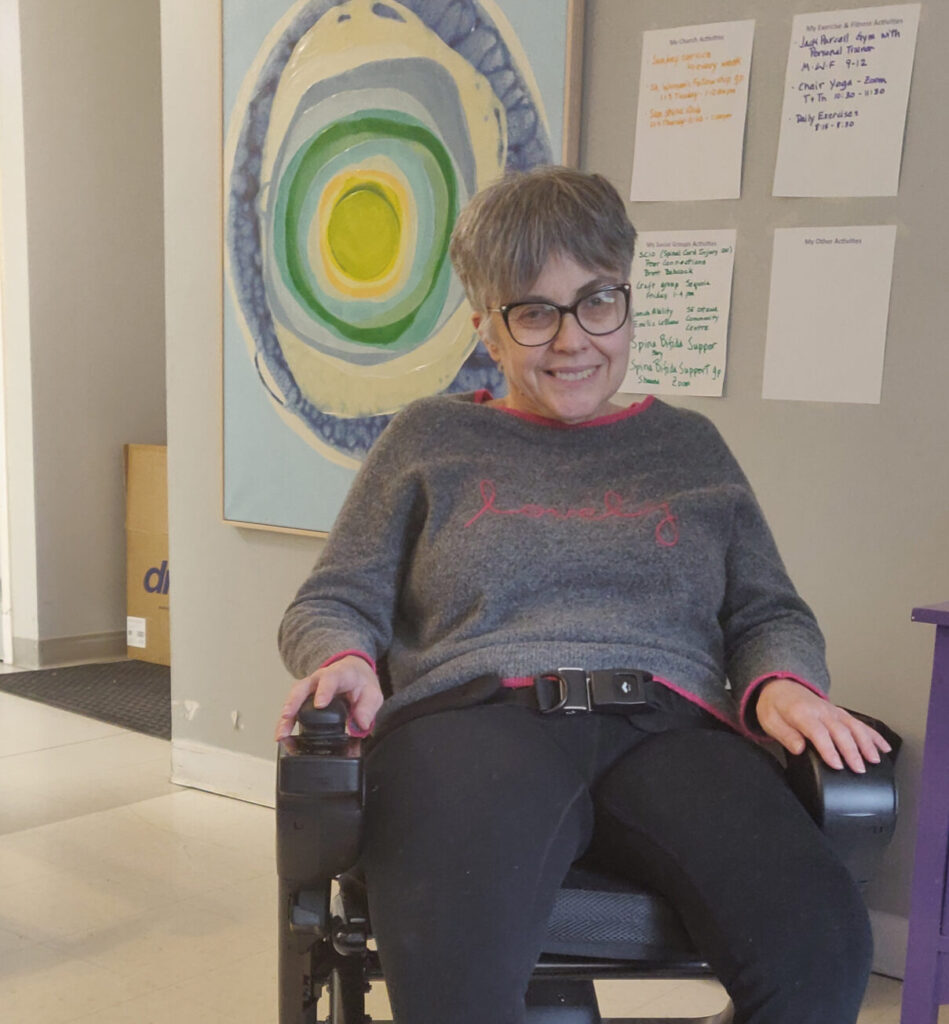Angie Mintz is self-confident and engaging with a captivating smile. She does whatever she can to stay healthy to manage her spina bifida and hydrocephalus but does not take herself too seriously. This is evidenced by the pink and grey sweater she wears embroidered with the words,” lovely” and the bold stickers on her wheelchair that say, “Babe on Wheels” and “Hot Girls Hit Curbs”. A calendar of “feel good” aspirations
prominently displayed on her kitchen table reminds her to stay positive.
Now aged 58, the Ottawa resident keeps busy with her neighbourhood church with bible studies, arts and crafts and book exchanges. Angie is also involved with Hydrocephalus Canada through online information sharing meetings and regular lunches at the Ottawa Tasters club.
Angie has always been a people person, but she also knows that she can learn from others like herself who have disabilities, which is why these groups matter to her.
For 25 years, Angie has lived in a spacious, tidy apartment in an attendant care building. She has onsite support from staff who help her with her daily personal care, but Angie does as much as she can by herself.
Angie’s support system consists of her older sister, niece, and many friends. Her cellphone and iPad are important tools for recording important appointments that she might otherwise forget. She also tapes paper reminders of upcoming social events; fitness activities, meal planning, and grocery lists on her walls. She shops online for her groceries and gets them delivered.

Up until Angie was in her mid-forties, she had a boyfriend named Warren. They met at the building where she now lives and enjoyed 25 years together travelling in his accessible van on many day trips.
Warren had paraplegia from a motorcycle accident, so he understood the various challenges of living with a disability – health issues, physical and attitudinal barriers. Their bond lasted until Warren died from sepsis while in long-term care.
Angie is grateful for the life she had with Warren and misses him. At times, however, she believes he pushed her too hard, encouraging her to walk without her crutches, which she was using before she needed a wheelchair.
Angie was born in rural New Brunswick and moved to St. Thomas, Ontario when she was eight years old.
In rural New Brunswick there was no kindergarten, so she began school at age six, attending half-days for the first year.
This was years before Bill 82 was passed in 1980, which brought accommodations for special needs education.
Even though her teachers lacked appropriate training to help Angie meet her full potential, she graduated Grade 12 Special Education at Arthur Voden School and took further studies at Fanshawe College to upgrade her studies.
“I remember passing grade two, despite my learning challenges. When we moved to St. Thomas, I started grade three and went to Locks Public School, which offered special education programs. I also went to the Children’s rehabilitation program in nearby London a few times a week for occupational therapy. Before I entered high school, I continued in special education and was integrated in the mainstream education programs the other half of the time.”
According to Angie, “I was closer to my mother than my father. My mom did a lot for me, and I often thought she was overly protective. My sister Rosemary would often advocate for me and remind my mom that I could do things on my own.
“It was my sister who invited me to move to Ottawa to live with her and her husband in 1990.”
Angie was happy to make the move and start a new life there. Rosemary was the catalyst for her independence and still is today, but the move was hard on her mother, who was not sure Angie could manage away from home.
She stayed with her sister and brother-in-law before moving to the YWCA and enrolling in a retail-training program, which had onsite and in class training.
“My first job was at Marks and Spencer’s where I worked in the stock room. I was unhappy there, feeling both underemployed and hidden. Occasionally, I would work in the fitting room. But I was not living up to my potential and the work was only part time. I decided to launch a complaint with the Human Rights Commission, but I lost the case because my manager believed that he had not done anything wrong. I think today it would be different, with laws in place to protect people with disabilities in the workplace.”
After Angie left Marks and Spencer’s, she enrolled in what was then the Vocational Evaluation Unit at the Ottawa Rehabilitation Centre, which offered specialized training and employment support programs for people with disabilities to help them achieve their potential. She obtained a work placement at the Salvation Army as a receptionist and did odd jobs in the sorting room. She was paid for two hours and volunteered the rest of the time.
“I had many challenges as a receptionist because I could not answer several lines ringing at once and was often overwhelmed, asking my co-workers to help me answer the phones.”
Angie worked there for about 12 years before she left, seeking further workplace training, and applying to the Neil Squire Society, which provides training, accommodation, and rehabilitation support for people with disabilities.
Angie’s work placement at Neil Squire was more positive. The team understood her need for a calm environment, which led to a work placement at a long-term care facility.
“I felt at home with seniors as my parents were older and had many older friends. I answered the phones, greeted, and directed visitors. I was very friendly with the executive director who provided me with further training on the dementia ward where I fed and visited the clients. I liked it there as I got to know the residents as it was very interactive, and I am a very social person.”
“About five years later, I made friends with two women, Elizabeth and Shannon who were roommates there. I would play board games with them. It was fun, except one of them would not like to lose! When Elizabeth died, Shannon was very lonely, so I spent a lot of time with her to offer support and comfort.
“I also advocated for Shannon when I noticed that the personal support workers were mistreating her, and I encouraged her to speak with the director of care. I felt that someone had to speak up as she was being walked over. PSWs were not treating her well. Things improved for Shannon, but because she was hesitant to speak up for herself, the results did not last. Angie continued to visit her friend after she was no longer working at the long-term care facility.
Angie looks forward to volunteering at the Ottawa Rehabilitation Centre in the upcoming months. She also is working hard with a fitness trainer at a nearby gym to regain her strength after recent surgery to correct spinal stenosis (a narrowing of the spinal canal in the lower back) which caused numbness in her hands and feet. Following her surgery, she has an exercise program to strengthen her arms. The surgery has also helped her regain some strength in her legs so she can walk with crutches for short distances if she is not alone.
Looking ahead, Angie wants to maintain her quality of life and do whatever is necessary to avoid long-term care facilities.
“I know what it is like from my volunteer work with seniors. It would be frustrating. Even now, I experience challenges from staff who want me to use a hospital bed instead of my current one because it would be easier for them.
“Workers see my wheelchair and think I cannot be independent. Sometimes the attendants do things for me because it’s faster for them, but they are taking away my independence. It frustrates me. I want to be independent. These are my challenges with them.”
What is next for Angie? She looks forward with much excitement to trying adaptive water skiing this summer and other sports to keep active.
Angie’s advice to those of us with spina bifida and hydrocephalus is simple: Do as much as you can by yourself. Don’t listen to others who say you cannot do things. And always remember to stand up for yourself when something is not right for you.
A Story Written by Mary Dufton




